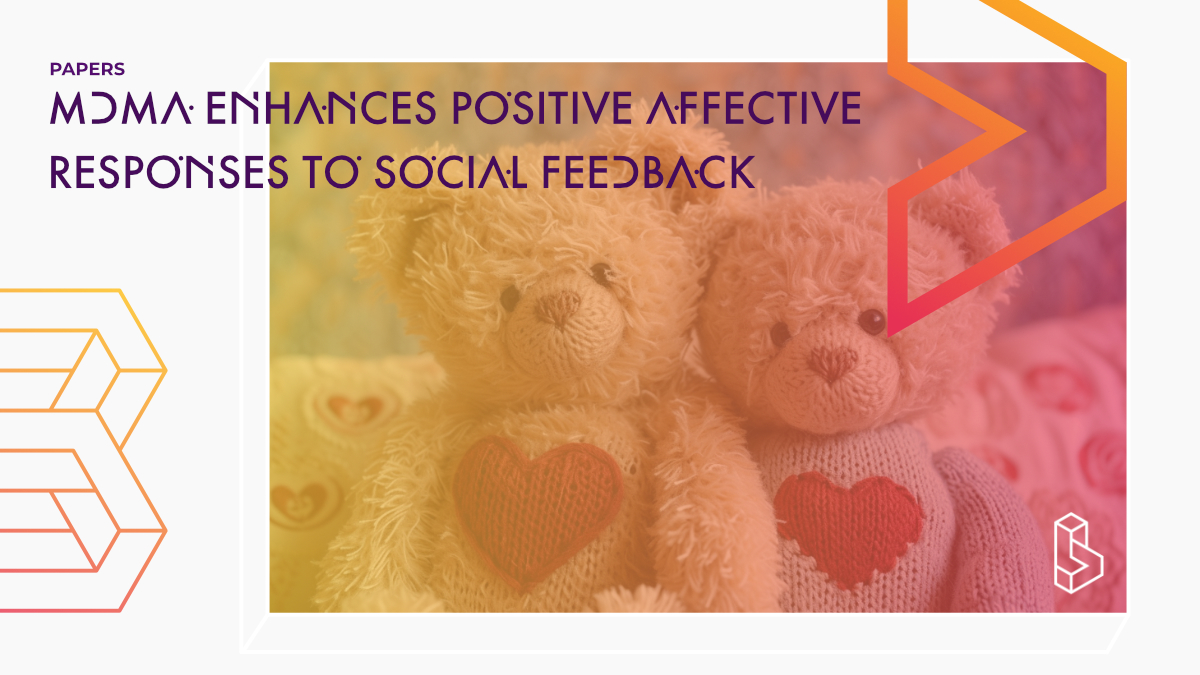This double-blind, placebo-controlled crossover trial (n=36) investigates the effects of two doses of MDMA (52.5-105mg/70kg) compared to both placebo and methamphetamine (20 mg) on responses to personalized social feedback in healthy adults. The study concludes that the higher dose of MDMA increases positive affective responses to social feedback, suggesting a potential mechanism by which MDMA may enhance social connection.
Abstract of MDMA enhances positive affective responses to social feedback
“Background: The prosocial compound ± 3,4-methylenedioxymethamphetamine (MDMA) is an amphetamine derivative that has shown promise as an adjunct to psychotherapy in the treatment of post-traumatic stress disorder. MDMA increases positive responses to social images, and it has been suggested that the ability of MDMA to positively bias social perception may underlie its therapeutic efficacy as a psychotherapy adjunct. However, the effect of the compound on affective responses to positive or negative social feedback has not been tested.
Aims: In this study, we aimed to test the effects of MDMA compared to placebo and the prototypical stimulant, methamphetamine (MA), on responses to positive and negative social feedback.
Methods: This was a double-blind, placebo-controlled, crossover trial (NCT03790618), comparing the effects of two doses of MDMA (0.75 mg/kg, 1.5 mg/kg) to both placebo and MA (20 mg) on responses to a personalized social feedback task, similar to a dating app, in healthy adult volunteers ages 18–40 (N = 36, 18 women, 18 men).
Results/Outcomes: The high dose of MDMA increased positive affective responses to social feedback.
Conclusions/Interpretations: These findings suggest one process by which MDMA may facilitate social connection. Further work is needed to understand how MDMA affects responses to more generalized types of social feedback and to understand these effects in clinical populations.”
Authors: Anya K. Bershad, David T. Hsu & Harriet De Wit
Summary of MDMA enhances positive affective responses to social feedback
Social processing is critical to functioning in society and maintaining healthy family, social, and professional relationships. However, many patients with psychiatric disorders experience either heightened responses to negative social input or blunted responses to positive social input.
The amphetamine derivative MDMA, which is known as an “empathogen” for its ability to induce feelings of social connection, may be a promising way to bias social perception positively. MDMA enhances subjective feelings of sociability, friendliness, and confidence, in addition to positive affective responses to social cues. MDMA induces the release of dopamine, norepinephrine, and serotonin through the release of serotonin, which leads to the release of oxytocin, which may explain some of the prosocial effects of the drug.
Find this paper
MDMA enhances positive affective responses to social feedback
https://doi.org/10.1177/02698811231224153
Paywall | Google Scholar | Backup | 🕊
Cite this paper (APA)
Bershad, A. K., Hsu, D. T., & de Wit, H. (2024). MDMA enhances positive affective responses to social feedback. Journal of Psychopharmacology, 02698811231224153.
Linked Research Papers
Notable research papers that build on or are influenced by this paper
Effects of MDMA on attention to positive social cues and pleasantness of affective touchThis randomized, double-blind, placebo-controlled study (n=36) investigated the effects of MDMA (52.5 to 105 mg/kg) and methamphetamine (20 mg) in healthy young adults on behavioral and psychophysiological response to socially relevant, “affective” touch, and visual attention to emotional faces. The tests showed that MDMA positively influenced responses to affective touch, but neither drug influenced ratings of observed touch.
Linked Clinical Trial
Effect of Stimulant Drugs on Social PerceptionThe study will improve our understanding of the "prosocial" effects of ± 3,4-Methylenedioxymethamphetamine (MDMA), relative to a prototypical stimulant, methamphetamine (MA). The investigators seek to characterize the "uniquely social" effects of MDMA.

